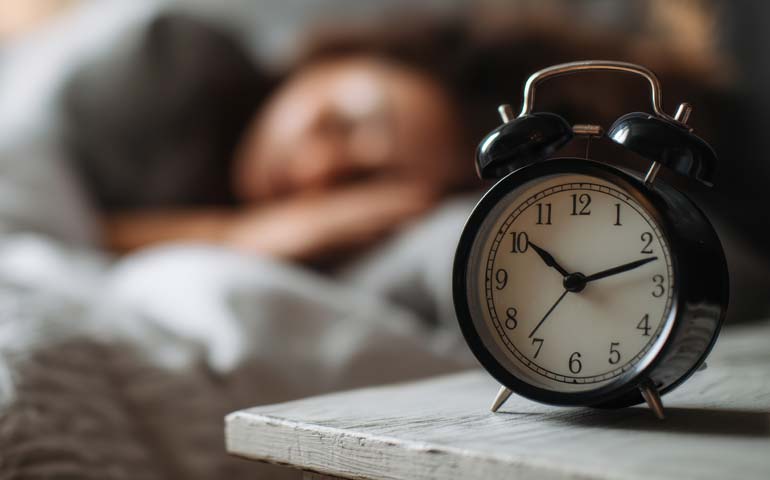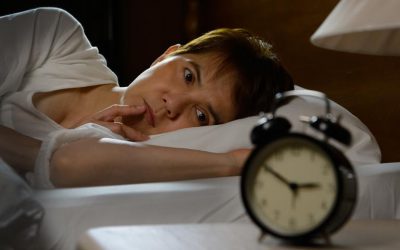Women's Health Info
Effects of Sleep Problems During Menopause
Overview: sleep problems in women during menopause transition
- The SWAN study has found that sleep quality and quantity decline in women, beginning in peri-menopause, as they transition into menopause and after.
- Among midlife adults (aged 45 – 64 years), the percentage who slept < 7 hours on average within a 24-hour period was similar for men (31.1%) and women (30.7%).
- These percentages improved among older adults aged ≥ 65 years, but a higher percentage of women (25.5%) than men (22.6%) slept < 7 hours
- Sleep disturbances during this period – such as waking several times during the night – can significantly impact a woman’s well-being and quality of life.
- Additionally, associations have been observed between sleep problems and specific menopausal symptoms, particularly hot flashes, mood changes and trouble falling asleep.
- These issues increase during perimenopause, the period prior to menopause when the ovaries stop working.
- Postmenopausally, sleep problems stabilize or get better for the majority of women.
- These findings emphasize the importance of addressing sleep issues early-on, as women begin the menopausal transition, to help overall women’s health and wellness.
Understanding the effects sleep disturbances during stages of menopause
Sleep disturbances are prevalent during the stages of menopause, and their impact extends beyond nighttime restlessness. Sleep quality or insufficient sleep can contribute to various health conditions in women, including cardiovascular disease, cognitive impairments and mental health issues. By studying sleep during menopause, Study of Women’s Health Across the Nation (SWAN) researchers are uncovering the links between sleep and these health outcomes.
Additionally, SWAN has contributed to a greater knowledge of gender differences in sleep and sleep disorders, particularly insomnia, emphasizing the need to consider factors unique to women in sleep research. Understanding the complex relationships between sleep and women’s aging (both chronological aging and reproductive aging, ie, hormone changes) during the menopause transition is essential for improving overall well-being and quality of life.

SWAN is a long-term, multi-racial and ethnic, and multicenter research project that aims to understand the physical, biological, and psychosocial changes that occur in women during the menopause transition. Researchers are examining various aspects, including hormone levels, sleep patterns, cardiovascular health, bone density, and psychological well-being. By studying a diverse population of women over time, SWAN aims to provide comprehensive insights into the menopause transition and its impact on women's health.
SWAN study: impact of sleep problems during menopause transition
Research shows that sleep problems became more prevalent as women transitioned through menopause, although the severity differed among individuals. Not all women had sleep issues, but some always had sleep problems.
The median duration of follow-up from pre-menopause through the transition to early post-menopause was 15 years. Some women had a low prevalence of sleep problems, while others had moderate, increasing or high prevalence. However, the group of women with the increasing prevalence pattern comprised the smallest group, about 15% of women.
Women who had trouble falling asleep, early morning awakening, and frequent hot flashes or night sweats were more likely to have persistent sleep problems even after menopause.
Researchers observed similar patterns of sleep problems among women whose menopause began following surgical removal of their ovaries (ie, surgical menopause). Importantly, problems with waking several times during the night were relatively stable across time post-surgery.
How menopausal women can improve sleep habits
There are a number of lifestyle changes to sleep habits women can practice to improve their sleep duration and quality as they age. Note that our researchers found that sleeping drugs are a one-time fix that don’t address problems or interconnected issues. Whereas sleep medications may help women with short-term insomnia to start sleeping better, they are not likely to help women in the long run, and work best when combined with behavioral treatments such as cognitive behavioral therapy for insomnia. Recommended lifestyle changes include:
- Establishing a regular sleep schedule. This means going to bed and waking up at the same time each day, even if you don’t get a full night’s sleep.
- Creating a relaxing bedtime routine. This could include taking a warm bath, reading a book or listening to calming music.
- Making sure your bedroom is dark, quiet and cool. These conditions are ideal for sleep.
- Avoiding caffeine and alcohol before bed. These substances can interfere with sleep.
- Exercising regularly, but not too close to bedtime. Exercise can help improve sleep quality. But it’s important to avoid exercising too close to bedtime, as this can make it harder to fall asleep.
- Seeing a doctor if you have chronic sleep problems. There may be an underlying medical condition that is causing sleep problems.
Remember, each woman’s experience with menopause and sleep disturbances is unique. It may take time and some experimentation to find the strategies that work best for you. Prioritizing good sleep hygiene and seeking guidance from qualified sleep professionals (board certified sleep medicine specialists – LINK to American Academy of Sleep Medicine web page) when needed can help women navigate this phase with improved sleep and overall well-being.
Latest sleep news
SWAN Investigators Lead by Dr. Leslie Swanson Recently Published an Article Linking Sleep Timing and Cognitive Performance
SWAN investigators led by University of Michigan researcher Dr. Leslie Swanson recently published article linking sleep timing and cognitive performance.
SWAN Research a Key Source in Menopause Myth Busting
Scientific American’s recent article, “The Surprising Biology Behind Menopause’s Worst Symptoms,” credits research by SWAN.
Trajectories of Sleep Over Midlife and Incident Cardiovascular Disease Events
In the study, Trajectories of Sleep Over Midlife and Incident Cardiovascular Disease Events, SWAN researcher Rebecca Thurston, Ph.D., sought to further the understanding of the importance of sleep for health.
US News & World Report article titled, “Sleep Key to Good Mental Health for Older Women” features SWAN investigator, Dr. Leslie Swanson
In this article, Dr. Swanson provides significant input on sleep timing, sleep regularity, and psychological health.
We are still learning from our sleep studies
While the SWAN study has made significant contributions, we are still conducting ongoing sleep studies to deepen our understanding of its impact on aging and menopausal women, as well as learn what factors contribute to improving and maintaining sleep health. Researchers continue to explore the complex interplay between physical function, hormonal changes, wellness and cognitive health.
Reviewed by:
Howard M. Kravitz, DO, MP, Professor, Rush University Medical Center






